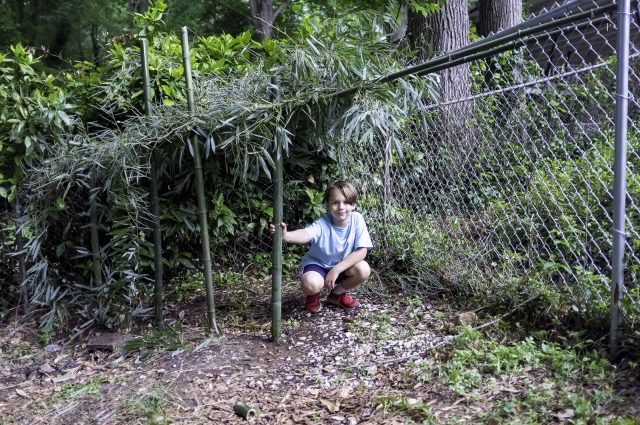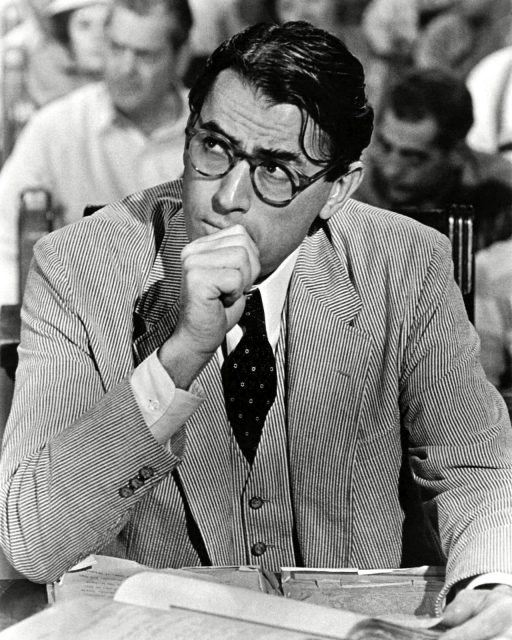
Atticus Finch — what a hero. What a fantastic lawyer. That’s what we all walk away thinking the first time we read To Kill a Mockingbird. We read his cross-examination of Bob and Mayella Ewell and think, “He did a really good job establishing Tom’s innocence,” and can’t understand how Tom could be found guilty– though we can understand it because it’s Depression-era Alabama.
The state has not produced one iota of medical evidence to the effect that the crime Tom Robinson is charged with ever took place. It has relied instead upon the testimony of two witnesses whose evidence has not only been called into serious question on cross-examination, but has been flatly contradicted by the defendant.
Nailed it — keep hammering on the fact that no doctor was called, Atticus.
She was white, and she tempted a Negro. She did something that in our society is unspeakable: she kissed a black man. Not an old Uncle, but a strong young Negro man. No code mattered to her before she broke it, but it came crashing down on her afterwards.
Her father saw it, and the defendant has testified as to his remarks. What did her father do? We don’t know, but there is circumstantial evidence to indicate that Mayella Ewell was beaten savagely by someone who led almost exclusively with his left. We do know in part what Mr. Ewell did: he did what any God-fearing, persevering, respectable white man would do under the circumstances—he swore out a warrant, no doubt signing it with his left hand, and Tom Robinson now sits before you, having taken the oath with the only good hand he possesses—his right hand.
There it is — that brilliant evidence that someone lefthanded inflicted the bruises on the right side of Mayella’s face. Tom’s left arm was mangled in a cotton gin when he was young — he couldn’t have done it. Case closed.
And then that impassioned closing:
Thomas Jefferson once said that all men are created equal, a phrase that the Yankees and the distaff side of the Executive branch in Washington are fond of hurling at us. There is a tendency in this year of grace, 1935, for certain people to use this phrase out of context, to satisfy all conditions. The most ridiculous example I can think of is that the people who run public education promote the stupid and idle along with the industrious—because all men are created equal, educators will gravely tell you, the children left behind suffer terrible feelings of inferiority. We know all men are not created equal in the sense some people would have us believe—some people are smarter than others, some people have more opportunity because they’re born with it, some men make more money than others, some ladies make better cakes than others—some people are born gifted beyond the normal scope of most men.
But there is one way in this country in which all men are created equal—there is one human institution that makes a pauper the equal of a Rockefeller, the stupid man the equal of an Einstein, and the ignorant man the equal of any college president. That institution, gentlemen, is a court. It can be the Supreme Court of the United States or the humblest J.P. court in the land, or this honorable court which you serve. Our courts have their faults, as does any human institution, but in this country our courts are the great levelers, and in our courts all men are created equal.
I’m no idealist to believe firmly in the integrity of our courts and in the jury system—that is no ideal to me, it is a living, working reality. Gentlemen, a court is no better than each man of you sitting before me on this jury. A court is only as sound as its jury, and a jury is only as sound as the men who make it up. I am confident that you gentlemen will review without passion the evidence you have heard, come to a decision, and restore this defendant to his family. In the name of God, do your duty.
What a perfect defense! What insight! What an amazing job defending a man in a hopeless situation!
That’s what we think when we’re not lawyers, though. But what about a trial lawyer who’s had twenty years’ experience in the courtroom? Someone who’s represented defendants against charges of rape and murder?
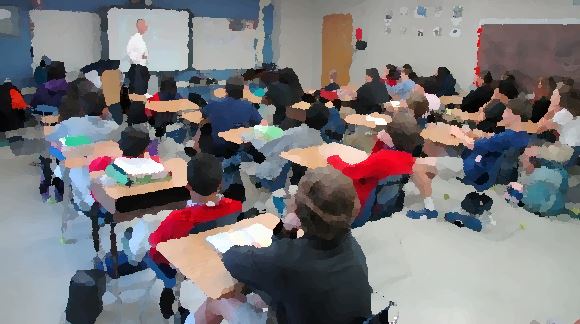
Every year, as the kids finish up Mockingbird, I have Jim Bannister, a local defense attorney, come in and walk the kids through the details of the trial and evidence. He’s been doing this presentation for some years, ever since a friend’s daughter read the book. The friend asked him what he thought of Atticus’s defense and, not having read the book since middle school, Bannister reread the chapters dealing with the trial.
“I would have handled things a little differently,” he remarked. “To be fair,” he’s always added when talking to the kids, “Atticus seems to be a tax and/or estate lawyer, so he was not in his area of specialization at all.” Still, he helps the kids see the mountains of evidence that Atticus could have brought into the trial that doesn’t even get a mention.
The most damning evidence does appear in the book, but Atticus doesn’t push it hard enough: no doctor was ever called. This means there’s no evidence that the crime even took place. But there’s so much more than that.
What about clothing the accused and supposed victim were wearing? How could Tom, who’s left arm is all but useless, hold down Mayella as she claimed, take off his clothes, take off her clothes, and rape her while using only one arm? It doesn’t make sense — it’s physically impossible.
What about defensive wounds on Tom? Mayella said she fought him “tooth and nail.” There should have been scratches all over Tom’s face.
What about the window through which Bob says he saw the rape in progress? Earlier in the book, the Ewell house is described and we discover that there’s cheesecloth over the windows instead of glass panes. How clean was that cheesecloth? How much could Bob actually see?
And if his daughter was being raped and all that stood between him and the rapist was a bit of cheesecloth over a window no more than three feet above the ground, why didn’t he dive through the window and attack Tom? Instead, he claims he witnesses the rape in the front room and runs around the entire shotgun house and enters through the back door.
All these were failures on the part of Heck Tate, the sheriff, who did absolutely no investigation at all. “I would tear him apart on the stand,” Bannister laughs.
For me, though, the most jaw-dropping piece of evidence was a little gem hidden in Tom’s account of the event.
“Mr. Finch, I was wonderin’ why it was so quiet like, an‘ it come to me that there weren’t a chile on the place, not a one of ’em, and I said Miss Mayella, where the chillun?”
Tom’s black velvet skin had begun to shine, and he ran his hand over his face.
“I say where the chillun?” he continued, “an‘ she says—she was laughin’, sort of—she says they all gone to town to get ice creams. She says, ‘took me a slap year to save seb’m nickels, but I done it. They all gone to town.’”
Tom’s discomfort was not from the humidity. “What did you say then, Tom?” asked Atticus.
“I said somethin‘ like, why Miss Mayella, that’s right smart o’you to treat ’em. An‘ she said, ’You think so?‘ I don’t think she understood what I was thinkin’—I meant it was smart of her to save like that, an‘ nice of her to treat em.”
Why in the world didn’t Atticus call to the stand that ice cream salesman?! Everybody in the town knows the Ewells; everyone knows how poor they are. To see all seven of them come traipsing up with nickels in hand to buy ice cream would have been a once-in-a-lifetime, always-remember-it moment.
So he comes every year to lead students through these pieces of evidence, suggesting at the outset that they pretend like he’s the lead attorney and they are his paralegals, investigators, and co-attorneys. “Let’s see if we can’t put together a better defense for Tom Robinson.”
Except he couldn’t come this year for all the obvious reasons. Yet when I asked him if he’d be willing to give it a shot on Google Meet, he didn’t hesitate: “What dates are we looking at?”

And so he sat in his study and led several of my students through a discussion via Google Meet, and my eighth-grade vice principal (well, she will be next year after our current, much-loved vice principal retires) popped in eagerly when I told her what we were planning.
Despite the frustration of the lockdown, it was a good day to be a teacher.
The Day’s Adventures
The Boy has wanted to build a bamboo structure of some sort for some time now. He had in his mind a large and grand structure, perhaps with a swimming pool beside it and a diving platform coming out of the second story.
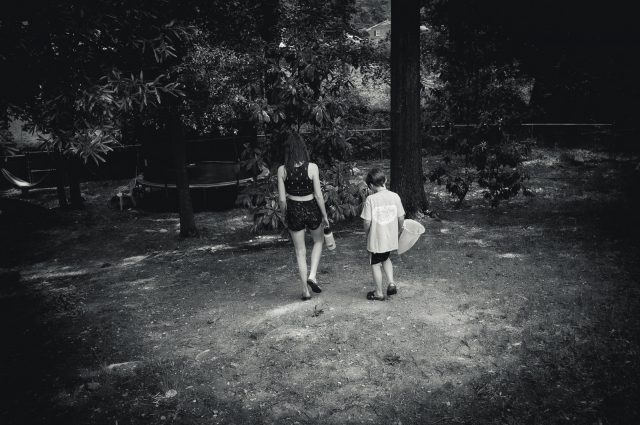
Today, I suggested a little more modest structure: “We could simply use the corner of our fence and Mr. F’s fence and build it there.
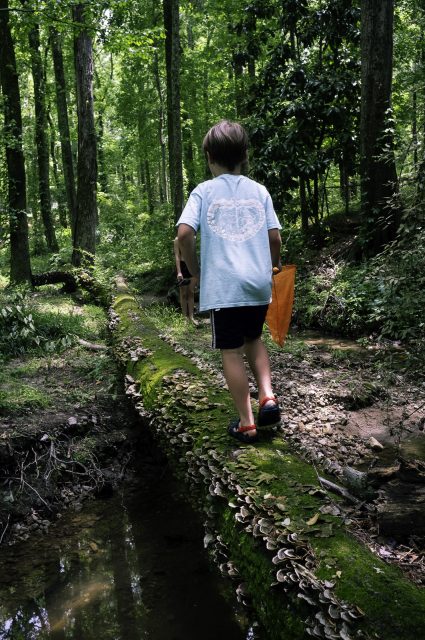
And so we went out into the stand of bamboo growing in Mr. F’s back yard (more or less — not really sure of property lines there) and took a few canes.
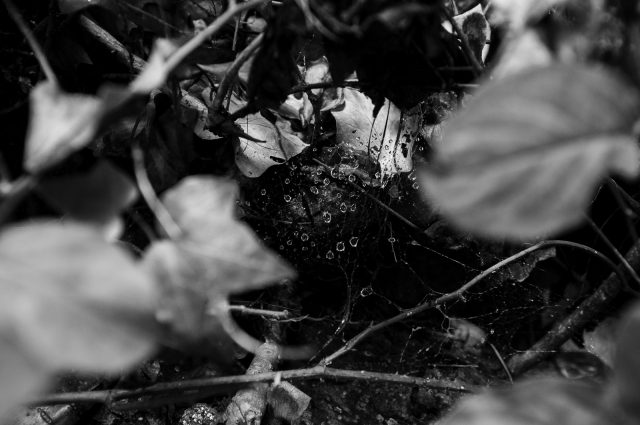
We stripped off the small branches on which grow the leaves, cut them to length,
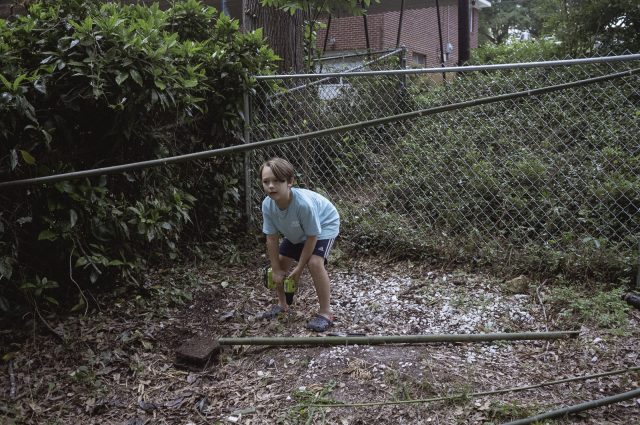
dug a few holes, and we had our basic frame. A little more work and we had a functional structure.
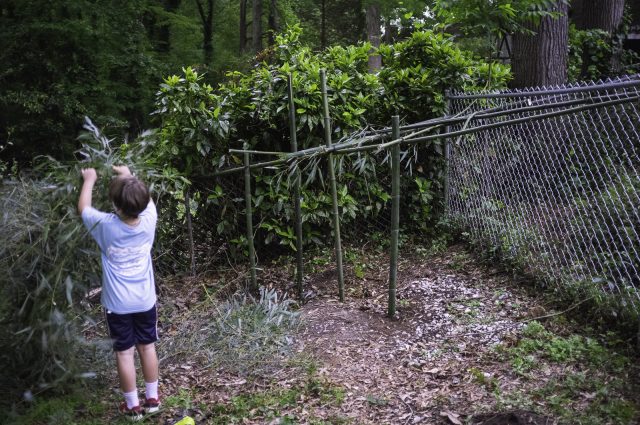
A good day to be a dad.
